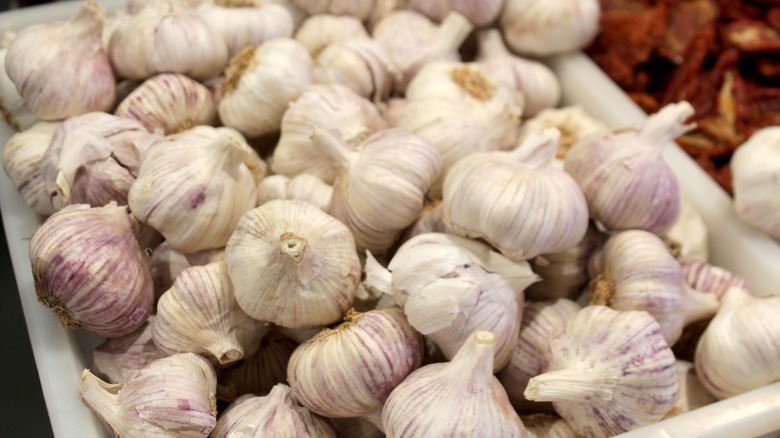Why You Should Think Twice About Using Minced Garlic On Cast Iron
While many people swear by the cast iron skillet as their go-to, all-purpose kitchen staple, there is no denying they are finicky tools with lots of rules to follow and factors to take into consideration when purchasing or using one. Most people know these pans weigh a lot and need special cleaning and storage to avoid rust and maintain performance, but did you know you also might have to be careful about what you cook in them?
While chefs like Martha Stewart advise caution when cooking with super-acidic foods like tomatoes which can degrade the pan's seasoning (the protective oily layer of the pan's surface that keeps it from sticking), it can be used in moderation. According to Southern Living, though the one thing you never want to take your chances with is not an acidic food; it's a smelly food: minced garlic. Although garlic itself is not always off-limits for cast iron, minced garlic should be avoided. Minced garlic cooks very fast and can burn quickly, which can cause it to stick to cast iron pans, creating a terrible mess to clean up. Additionally, Southern Living notes that the seasoning can absorb the smells and flavors of things that get cooked in the pan, which is not ideal for sweet or non-garlicky foods cooked after the garlic dish.
How to handle garlic
So if you can't add fresh, minced garlic to your dish while you're cooking, how are you supposed to get your favorite seasoning on your food? The good news is that all garlic is not off-limits. Instead of minced garlic, Southern Living recommends using whole cloves of garlic with extra cooking oil to impart that delicious garlic flavor into your meats or sauces, while NOLA suggests using garlic powder in cast iron skillet recipes.
If you do go ahead and try minced garlic in your cast iron pan and it goes badly (or if it goes well but leaves an unpleasant aftertaste in your skillet), fear not! There are ways to get rid of unwanted odors and flavors in your cast iron cookware. According to Lodge Cast Iron, there are several methods you can get rid of unwanted, lingering odors in your cast iron skillets. Lodge recommends baking the pan in the oven for 15 to 20 minutes at about 400 degrees Fahrenheit, which is hot enough to eliminate odor but not hot enough to damage the seasoning. Smells can also be handled by coating the inside of the pan in table salt and leaving it to sit out overnight before rinsing the salt– and the smells– out in the morning. Finally, if all else fails, you may have to scour and re-season the pan, which, while inconvenient, is certainly not the end of your pan.

